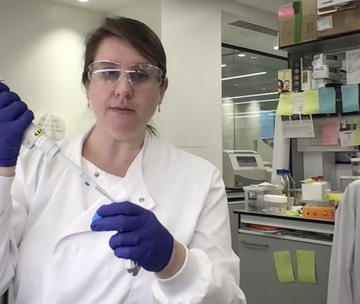Kavli Institute's First Kavli Fellow Lindsay Baker Appointed as Associate Professor in Biochemistry
Kavli Institute's First Kavli Fellow Lindsay Baker Appointed as Associate Professor in Biochemistry
The Kavli Institute for Nanoscience Discovery is thrilled to announce the appointment of Lindsay Baker as Associate Professor of Molecular and Cellular Biochemistry at the Department of Biochemistry. Lindsay, the first Kavli Fellow, brings with her a wealth of expertise and a dedication to cutting-edge research in the field of nanoscience and biochemistry. In a recent interview, Lindsay shared insights into her journey, her vision for future research, and the exciting prospects she envisions for the institute and the broader scientific community.

Q: Can you tell us about your journey from being trained as a physicist to becoming an Associate Professor in the Department of Biochemistry? What inspired this transition into biochemistry?
A: As a teenager, I was interested in both biology and physics. Now, I can see that the biology I enjoyed most then was actually biochemistry. At the time, I could more clearly see the questions that physics could ask and answer, and how that would contribute to our understanding of the world. It was as an undergraduate that I began to appreciate the interesting problems in biochemistry, and as a graduate student I understood that my background in physics gave me a unique perspective to tackle those problems.
Q: Cryo-electron microscopy (Cryo-EM) is a fascinating field. How did you become interested in it, and what are some of the most exciting discoveries or projects you've been involved in using this technology?
A: I think humans have a particular drive to understand how things work, whether that’s taking things apart as children to trying to see inside cells as scientists. Being able to directly image things that are too small to see by any other method is extraordinarily powerful and from the moment I ‘saw’ my first protein molecule, I was hooked. The level of detail we can now observe directly inside a cell is unprecedented, and almost every day on the microscope there is a new observation.
Q: As the first Kavli Fellow and now an Associate Professor, you've achieved significant milestones in your career. What advice do you have for aspiring scientists, especially those looking to make interdisciplinary transitions like you did?
A: I think truly interdisciplinary science has to be collaborative science, and requires an open mind, creativity and tenacity. Respect others’ expertise and be confident in your own. Learn everything you can about how other people view the world, and find people who can support you but will also question your assumptions.
Q: Your work lies at the intersection of physics and biochemistry. How do you see the future of interdisciplinary research shaping scientific advancements, and what are some of the challenges and opportunities in this space?
A: It sounds simple, but I think one of the biggest challenges in interdisciplinary work is communication - each field develops a lexicon and they are not always compatible. It can take a surprising amount of time and energy to dissect your word choices and ensure you’re communicating clearly. It sometimes feels like those jokes - ‘A physicist, a chemist and a biologist walk into a bar…’
The opportunities come from persevering through the communication challenges - someone in a different field can provide an entirely new way of looking at the world, or present a solution to a problem you never would have considered.
Lindsay's appointment marks a significant milestone for the Kavli Institute, reflecting its commitment to fostering exceptional talent and groundbreaking research. With Lindsay's leadership, the institute is poised to further its impact in nanoscience and make significant strides in understanding the complexities of biological systems. Her pioneering work serves as an inspiration for aspiring scientists and underscores the institute's unwavering dedication to pushing the boundaries of scientific exploration.
Since April 2021, Oxford University's KAVLI Institute for Nanoscience Discovery is proudly serving as a hub for research groups from seven different departments spanning both the medical and physical sciences, including the Baker Lab from the Department of Biochemistry.


